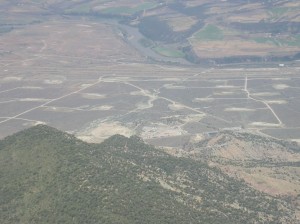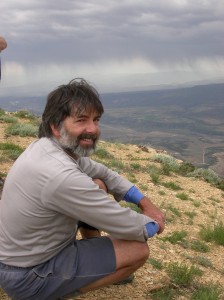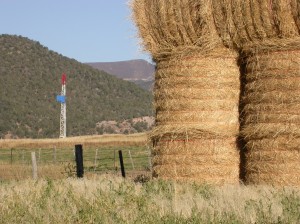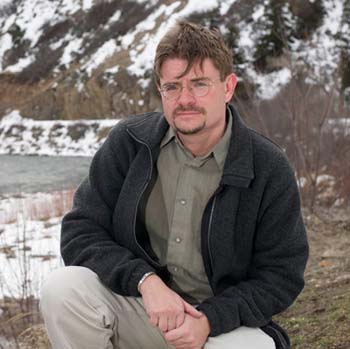
Western Colorado gas drilling creates a network of roads and well pads throughout rural areas. David Frey photo.
 As Garfield County sees its landscape transformed by the gas industry, local officials are left with little control, with the state claiming authority over the industry.
As Garfield County sees its landscape transformed by the gas industry, local officials are left with little control, with the state claiming authority over the industry.
But a recent state Supreme Court ruling suggests that the county may have more authority than was ever believed.
As Garfield County embarks on an overhaul of its land-use codes, some residents are asking it to play a bigger role in enforcing gas regulation.
“We believe the county can do more than it has been doing, even under state law,” said Steve Smith, a coordinator with the activist group Western Colorado Congress. “We believe state law should be altered so they can do even more beyond that.”
Residents are asking commissioners to take steps that are beyond their control, said County Commissioner John Martin, a Republican. The regulatory Colorado Oil and Gas Conservation Commission has been given the authority to oversee the gas industry, he said, and local governments can’t use their ordinances to regulate them.
“You can rewrite them,” Martin said. “Are they enforceable? No. If there’s any kind of conflict between (state) oil and gas rules and regulations and Garfield County regulations, the state of Colorado reigns supreme. They override any kind of regulation that you think you would want to put on if they find it detrimental. So if it’s detrimental to the industry, they’re going to override it, and your rules and regulations are unenforceable.”
On one battle the county took to the courts over gas drilling on private land, commissioners filed 63 complaints, from well location to density to air and water quality. Only three issues were ruled in its favor.
The county could draft stiffer regulations, Martin said, but it wouldn’t be able to defend them in court.
“We can spend the county’s money doing that, and that will satisfy some people that we are fighting,” he said. “But it may upset a lot more people, knowing that we are trying also to waste their money, knowing that we will never succeed.”
Tough regulations
But one county is having success. Southwestern Colorado’s La Plata County has long been an energy-industry hotspot. After concerns from landowners, the county put in place in the late 1990s what are considered the toughest county regulations on the energy industry.
“The commissioners were really supportive of trying to get these through,” said Steve Clay, a La Plata County planner who oversees oil and gas issues. “They were willing to be sued. They knew they were going to be sued over this. … If you try to get into a situation where you want to create regulations saying ‘try not to do anything that’s going to (provoke) a lawsuit,’ you’re not going to be able to get too far.”
The regulations have largely worked because energy companies have been willing to cooperate, Clay said. They were put in place only after long negotiations with operators over what rules they would and wouldn’t tolerate.
They did get sued. One key issue – control over noise levels – was struck down. Others lawsuits are still being fought. But one issue has been decided in their favor.
When a court ruled against the town of Frederick’s attempt to enforce regulations against industry in heavily-drilled Weld County, La Plata County appealed, arguing local governments should have the same land-use control over the gas industry as it has over any other.
The state Supreme Court ruled 2-1 in its favor in September, giving La Plata County the confidence to keep its rules in place, at least for now.
Some industry critics say Garfield County should do the same.
“Garfield County is deeply in the energy business. We can’t ignore it,” said Sue Daley, a former Breckenridge resident who settled with her husband in a log-kit home on a 100-acre ranch south of Silt. “For the county to turn their back on including it in their development code is just nonsensical.”
Commissioner Trési Houpt, a Democrat, agrees. She said the county should at least put in place regulations over issues like safety that it knows it can control. It might be worth risking a lawsuit to put in place even tougher regulations, she said.
“I think it’s always worth pushing the envelope when you believe something’s worth protecting,” she said. “I believe our environment’s worth protecting. I believe wildlife is worth protecting. I believe people’s quality of life and businesses are worth protecting.”
More control
Meanwhile, many agree that the state legislature should hand over more authority to local counties.
“I think it has to because it happens to be a land-use issue, and because we are being encroached upon – what we perceive as encroaching,” Martin said.
“It’s unpleasant. It’s noise. It’s smelly. It disturbs our peace and quiet. I mean, it changes our lifestyle. It’s going to have to change a little bit. But that’s gonna be up to a lot of hard work for the counties and the citizens, working with the oil and gas commission and the industry to get those things changed. It’s not going to be a panacea by passing some rules that are unenforceable. We’re going to have to come to a compromise with the industry and an acceptance from both sides, citizens and industry, saying we can live with these.”
Outgoing Rep. Gregg Rippy said standards may need to change, but it should happen statewide, not county by county.
“Just because you’ve got a county line there doesn’t mean that somebody across that line may not be impacted,” the Glenwood Springs Republican said.
That may mean changing the charge of the COGCC to have a stronger role in regulating surface impacts, he said.
Opponents want to change far more. By statute, five of the seven COGCC commissioners must have industry ties. Currently, they all do. Supporters say that’s needed because of the technical issues it sorts through. But opponents say that leaves the commission like a fox guarding the hen house.
In 1994, the commission’s role was expanded to protect the health, safety and welfare of landowners, but critics say too often it leans in favor of the industry and protecting profits.
“I think it is absolutely essential that we change the composition of the commission members,” said the WCC’s Smith.
Rippy backed a failed bill to give surface owners an extra representative on the commission. That met opposition from both industry and environmentalists who said it didn’t go far enough, he said. His predecessor, Russell George, of Rifle, pushed a bill to make the majority non-industry. It failed by one vote.
Industry representatives aren’t anxious for more regulation.
“If you allow the counties to start doing special permits for every well, for instance, and hold public hearings for every well, it would be very difficult to drill wells here,” said Steve Soychak, district manager at Parachute for Williams Production, a Tulsa, Okla.-based energy company.
“What’s that going to do for the supply outlook? I like the fact that it’s regulated by the state. Sometimes, I wonder if it shouldn’t be regulated by the nation, because it is an important energy supply. I realize it does impact the neighbors and we have to work with them and be good neighbors. I think the rules are pretty good right now with the Oil and Gas Conservation Commission.”
In La Plata County, Clay says, regulations have helped smooth over differences. After watching Garfield County landowners snap at industry representatives and storm away from a recent public meeting in Rifle, he said Garfield County’s squabbles look like La Plata looked a few years ago. Since then, he said, the animosity has cooled considerably.
“There is a way out of it,” he said. “They say there’s an informed consensus. That doesn’t mean everybody’s going to agree with what you’re trying to achieve, but everybody has to know that the county has to be able to regulate land use. The industry needs to be able to extract the minerals. The property owners need to be able to protect their property rights. There’s absolutely no way to have all three of them get exactly what they want.”



